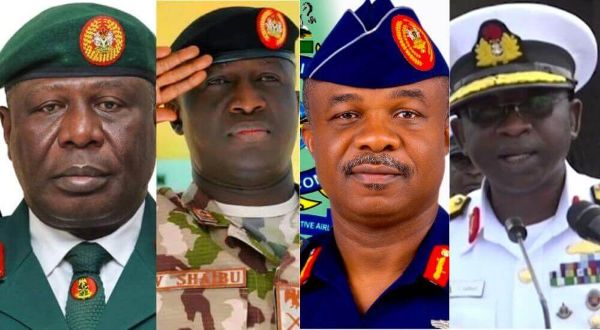A recent shake-up in Nigeria’s military leadership has led to a significant number of retirements among senior officers. President Bola Tinubu has appointed new service chiefs, relieving General Christopher Musa, Lieutenant-General Olufemi Oluyede, Vice Admiral Emmanuel Ikechukwu Ogalla, and Air Marshal Hasan Abubakar of their duties. General Olufemi Oluyede has been named the new Chief of Defence Staff, while Major-General W. Shaibu takes over as Chief of Army Staff.
The president has also appointed Air Vice Marshall S.K Aneke as the new Chief of Air Staff and Rear Admiral I. Abbas as the new Chief of Naval Staff. Notably, Chief of Defence Intelligence Major-General E.A.P Undiendeye retains his position. This reshuffle has triggered a wave of retirements, with approximately 160 senior officers across the services expected to leave their posts.
The Harmonised Terms and Conditions of Service (Revised 2024) dictate that officers who attain the rank of Major General or its equivalent are allowed to retire. The current appointments have pushed out officers from the 39 and 40 Regular Courses, with the new Chief of Army Staff, Maj Gen W Shuaibu, being from the 41 Regular Course. This means all officers senior to the 41 Regular Course will be retiring, resulting in a significant generational shift in the military’s leadership.
The Nigerian Army is expected to lose over 120 senior officers, including 57 generals from the 39 and 40 Regular Courses, as well as 64 National Guard officers who were absorbed into the Army in 1993. The Navy and Air Force are projected to lose around 40 officers combined. This mass retirement is not unprecedented, as a similar phenomenon occurred when the late Lt Gen Ibrahim Attahiru passed away, and Gen Faruk Yahaya took over.
The retirement of these senior officers is seen as a necessary step to clear the way for younger officers to rise through the ranks. Many of the retiring officers have been in their positions for decades and are no longer contributing significantly to the military’s operations. The new appointments are expected to bring relief to younger officers who have been blocked from promotion, while also marking a generational shift in the military’s leadership. With the 41 Regular Course now dominating the Army’s leadership, the military is poised for a significant transformation.
